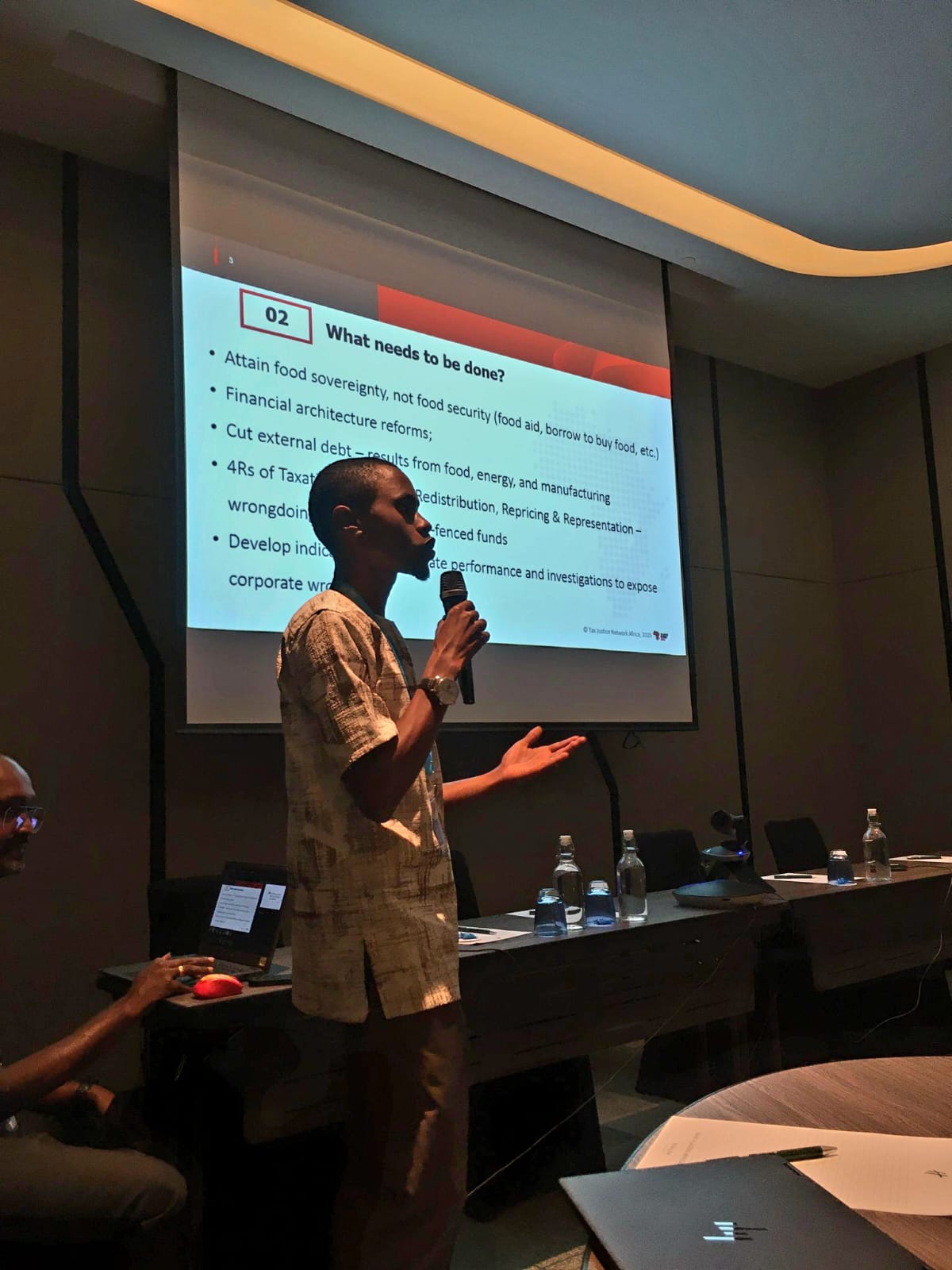Date

In the shadows of global food governance, a silent crisis is unfolding. In it, transnational corporations (TNCs) shape policies, dominate markets, and steadily erode democratic accountability. In response, experts are calling for the formation of a transnational coalition to confront this growing corporate influence and advocate for stronger public accountability at the United Nations General Assembly.
This urgent call was made during the United Nations University—International Institute for Global Health (UNU-IIGH) and Third World Network (TWN) Symposium, which TJNA participated in from 22 to 24 April 2025 in Kuala Lumpur, Malaysia.
The symposium brought together more than 100 health professionals, researchers, and civil society representatives from across the globe to examine the growing influence of powerful private actors (PPAs) in global health and food governance. Over the course of three days, participants explored how corporate interests are increasingly shaping not just markets, but the very institutions and frameworks meant to protect public well-being.
Central to the discussions were two interlinked concerns: the financialization of healthcare, where public health is treated as a commodity subject to market logic, and the deepening corporate influence over public policy, particularly through lobbying, public-private partnerships, and multistakeholder platforms. Experts warned that this unchecked power distorts priorities, sidelines public accountability, and reinforces inequalities, especially in low- and middle-income countries.
Participants unpacked how these trends intersect with food systems, exposing the ways in which profit-driven motives override public interest, weaken democratic governance, and obstruct efforts toward equitable and sustainable health outcomes. The message was clear: to protect public health and ensure food justice, corporate power must be confronted and reined in.
Fiscal justice emerged as a front-line issue. TJNA Policy Officer, John Thomi, highlighted how corporate tax avoidance starves public budgets needed for food sovereignty. “Without financial accountability, we cannot fund the alternatives we so urgently need,” he noted.
Jennifer Clapp of the International Panel of Experts on Sustainable Food Systems (IPES-Food) traced this dominance to decades of neoliberal reforms that hollowed out antitrust enforcement. The result? Market consolidation in seeds, agrichemicals, and food retail, accelerated by institutional investors and tech acquisitions. “It’s not just economic power,” she warned. “It’s political.”
This was echoed by Phil Baker of the University of Sydney, who pointed to the ultra-processed food (UPF) industry’s aggressive lobbying and marketing tactics. “Ultra-processed foods are not about nutrition—they are about profit. And the partnerships between corporations and UN agencies risk legitimizing this power under the guise of public-private cooperation.”
A recurring concern was the façade of accountability. Tools like the Access to Nutrition Index (ATNI), while designed to monitor corporate behavior, rely heavily on self-reported data. As Penelope Milsom of UNU-IIGH explained, this allows corporations to appear accountable without changing harmful practices. “It creates a dangerous illusion,” she warned.
Prof. Owain Williams of Deakin University proposed a more radical approach, public dashboards to track corporate power, scrutiny of Big Four consultancy firms, and transparency in institutional influence. His five-point plan centered on restoring public oversight and stripping away corporate impunity.
Mr. Akinbode Oluwafemi of Corporate Accountability and Public Participation Africa described how weak regulation has enabled the UPF industry to co-opt African cultural narratives. But civil society, he stressed, is pushing back hard, resisting not only unhealthy products but the erosion of cultural and community food systems.
Mauro Brero from the United Nations Children's Fund (UNICEF) acknowledged the delicate position of United Nations agencies.
“We need civil society organizations to hold us to account,” he urged, advocating for legal frameworks that move beyond voluntary compliance.
The session ended not with abstract calls, but concrete plans: a transnational coalition to map corporate power, craft shared messaging, and advocate at the UN General Assembly. Proposals included a global manifesto, unified civil society action, and strengthened links between researchers and grassroots movements.
From the presentations made, it was evident that the current food system is not broken; it is functioning exactly as designed: to serve concentrated corporate interests. Reclaiming it will require not only resistance, but reconstruction, grounded in equity, rights, and public accountability. The path forward demands courage, clarity, and collective action. But as the stories from around the world show, the seeds of transformation are already sown.
TJNA views fiscal justice as key to building equitable, sustainable food systems in Africa. Without financial accountability, investments in food sovereignty and alternatives to corporate dominance remain out of reach. Together with researchers, policymakers, and civil society, we are driving a movement to transform tax policies, challenge harmful investments, and restore control of natural resources to African nations.
For more information on the United Nations University - IIGH and Third World Network Symposium, please contact John Thomi at jthomi[@] taxjusticeafrica.net.